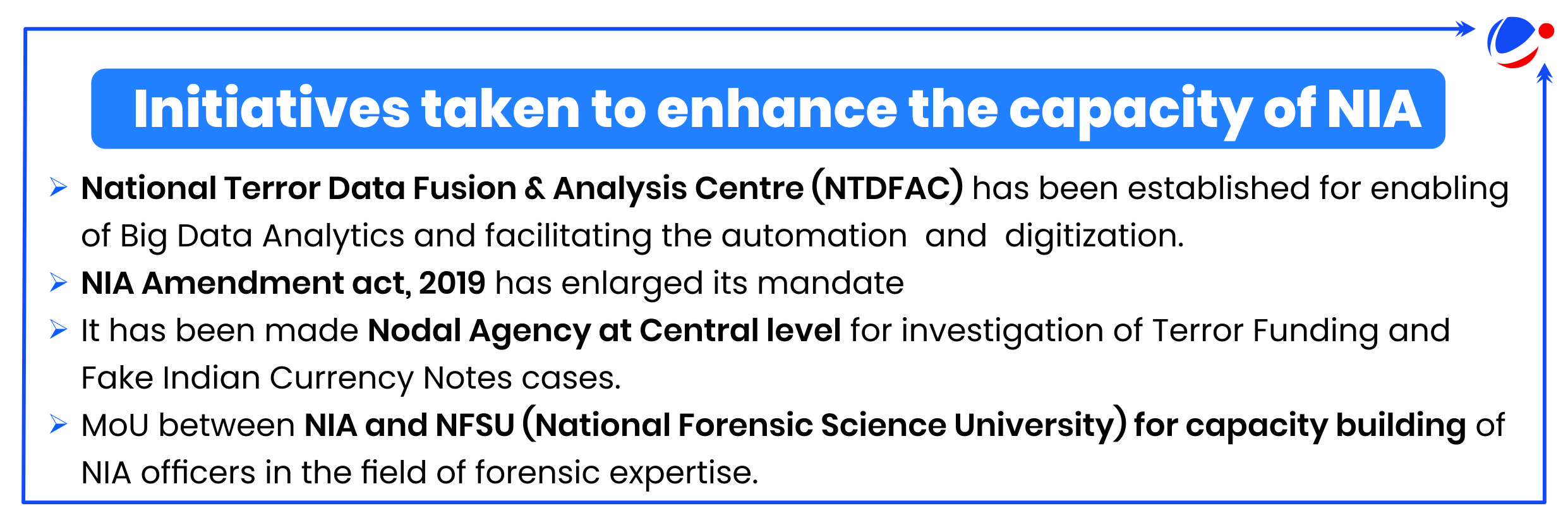Why in the news?
Supreme Court in Ankush Vipan Kapoor vs. NIA clarified that the powers of the agency are not restricted to probing offences mentioned in the schedule of the NIA Act or accused committing such "scheduled offences".
More on the news
- This ruling came while upholding the Punjab & Haryana High Court's decision to cancel bail granted to an accused in a case involving the smuggling of heroin from Pakistan into India.
- In the case, offences under the Narcotic Drugs and Psychotropic Substances Act (NDPS Act), which are not scheduled offences, were involved.
- The case involved connections to drug trafficking, hawala channels, and links to terrorism funding.
Supreme Court Ruling
- The Apex court ruled in favor of the NIA's authority to investigate non-scheduled offences linked to scheduled offences.
- SC interpreted Section 8 of the NIA Act in holistic view.
- Section 8 of NIA Act: While investigating any Scheduled Offence, the Agency may also investigate any other offence which the accused is alleged to have committed if the offence is connected with the Scheduled Offence.
- NIA can investigate another accused, although not being investigated for any scheduled offence on following condition:
- Opinion of NIA: It believe any other accused who has alleged to have committed an offence having a connection with the scheduled offence has also to be investigated.
- Central Government Approval: The NIA must report its opinion to the central government, who can authorize the investigation.
- Joint Investigation: Investigation of any other accused must be carried out jointly as far as practicable with the investigation of the accused already under progress owing to the connection between the scheduled offence.
Schedule of Offences Under the NIA ActThe NIA investigates offences under the following laws:
1A. Atomic Energy Act, 1962.
(a) Chapter VI of the Indian Penal Code. (b) Sections 370 and 370A of Chapter XVI of the Indian Penal Code. (c) Sections 489-A to 489-E (both inclusive) of the Indian Penal Code. (d) Sub-section (1AA) of section 25 of Chapter V of the Arms Act, 1959. (e) Section 66F of Chapter XI of the Information Technology Act, 2000. |
About National Investigation Agency (NIA)
- Establishment: Under the National Investigation Agency Act, 2008, which was enacted in the aftermath of the 26/11 Mumbai terror attacks.
- Objective: To investigate and prosecute offences that threatens India's sovereignty, security, and integrity, friendly relations with foreign States, matters relating to international treaties etc
- Schedule of Offences: The Act includes a schedule of laws under which the NIA can investigate and prosecute offences (given in the box above).
- Headquarters: New Delhi with 2 Zonal offices at Guwahati & Jammu.
- Headed by: Director-General (DG), who is a senior Indian Police Service (IPS) officer.
- Jurisdiction: It extends to the whole of India and it applies also
- To citizens of India outside India.
- To persons in the service of the Government wherever they may be.
- To persons on ships and aircrafts registered in India wherever they may be, and
- To persons who commit a Scheduled Offence beyond India against the Indian citizen or affecting the interest of India.
- Powers of NIA:
- Investigation: Central Government can direct NIA to investigate when it is of the opinion that a Scheduled Offence has been committed.
- Prosecution: The NIA can prosecute cases in specially designated NIA courts.
- Coordination with State Police: It collaborates with state law enforcement agencies during investigations.
- Extraterritorial Operations: The agency can investigate and prosecute offences committed outside India, subject to international cooperation agreements.
- Conviction rate: NIA has registered 640 cases from inception in which judgment has been pronounced in 147 cases with a conviction rate of 95.23%.

Conclusion
As the NIA evolves, its capacity to adapt to new challenges and coordinate with state and foreign organizations will be critical to effectively countering organized crime and terrorism.






